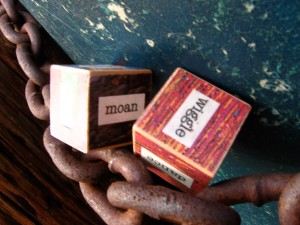Anyone who knows me is aware that I’m crazy about the links between movement and cognition (“embodied cognition” is the fancy term for it, I’ve recently learned).
So imagine my thrill when the following headline came across my email today:
Body Movements Can Influence Problem Solving, Researchers Report
In a recent study subjects were asked to solve a problem while taking occasional movement breaks. The problem involved strings that swung from the ceiling. Researchers discovered that the subjects who swung their arms during breaks were 40% more likely to solve the problem than people who simply stretched. Evidently, the subjects’ unconscious kinesthetic identification with the swinging motion helped them solve the problem!
You can read the whole article here if you want to, or just check out these excerpts by University of Illiois Professor Alejandro Lleras:
“This emerging research is fascinating because it is demonstrating how your body is a part of your mind in a powerful way. The way you think is affected by your body and, in fact, we can use our bodies to help us think.”
He continues with this practical take-home message (which makes me very, very happy):
If you are stuck trying to solve a problem, take a break. Go do something else. This will ensure that the next time you think about that problem, you will literally approach it with a different mind.
I’m crazy about this advice because my invention — the MuseCubes — are based on the idea that we can use our bodies to help us think.
The MuseCubes are a set of dice designed to — quite literally! — shake you free when you’re feeing stuck. The picture at the beginning of the post shows you one of the original sets.
Recently my InterPlay colleague Dorothy tried out the MuseCubes with some stressed out students at Yale University:
MuseCubes were SUCH A HIT on campus at Yale last week! SUCH A HIT! There were so many twisting-moaning, shaking-yelling, bending-howling moments. People letting loose and feeling more ready than ever to tackle their end of year classwork! PEOPLE LOVED THEM! I LOVED THEM MORE THAN EVER!
I’m so glad that my product could help bring stressed out students relief!
(Side Note: There are shocking statistics about mental health on college campuses, and I believe that is partially because of the unbalanced and unembodied ways we are expected to learn. But more about that in future blog posts).
What about you? What can YOU do to act on this research?
- If you’re curious about MuseCubes, please check out the website. I’m happy to send you a set or two.
- If you’re jazzed about this topic, and would like to read about how I used movement to help graduate students unpack heady concepts, check out this blog post about using the brains in our whole body.
- Maybe you need to go take a break right now?!
- But first, please comment below: how have you noticed movement influencing the way you think?


This is so fascinating. And it has a name! Embodied cognition, who knew.
Many people have Eureka moments while walking, running, swimming, etc and these are full body, two sided, symmetrical movements.
But people also report creative insights while doing manual work such as hand weeding (that’s me!) or washing dishes or quilting. Somewhat methodical and physical, and mentally not too taxing.
Driving seems to be another sort of creativity-friendly hypnotic experience.
I was just reading something about how side to side eye movement can increase short term memory for recalling things like lists.
Kids sometimes need to “shake the sillies out” and adults often benefit by renewed attention span by getting up and moving around a little.
I wonder how much of it has to do with increased oxygen flowing through the body?
And here’s another random factoid that sort of pops off the page for me every once in a while, labyrinth walking engages both left and right and seems to produce some interesting mental results.
Wonder what else is going on between brain and body that we don’t know about (yet)?
Can’t wait to hear what else you find!
Lovely, Barbara! I read an article in the New Yorker that I’ll try and blog about soon — about inspiration and where it comes from. It seems that by thinking intensely and focused about something for a while, and then giving ourselves time away, is the best way to get inspired. The brain continues to chew on the problem although we’re not conscious of it, and we feel the inspiration at random moments, like the ones you listed here. I’ll go dig that article up soon; maybe it’ll be part of my blogging week next week.
Thanks for being my cheerleader during this self-imposed challenge to blog 3-5 times this week. (I think it’ll be 3).
Ann, thank you sooooo much for chiming in, here. During grad school I paced in the back of the classroom. Actually, sometimes I would even sit on the floor and stretch (luckily I went to a school where this was acceptable behavior). I love your observation about the energy drain of defeating thoughts (like “this is too hard”), and how knitting-while-listening interrupts those sorts of thoughts. Yes!! Did you check out the MuseCubes? I find that they’re especially fun in community. My roommates and I will sometimes through the MuseCubes together — it’s more fun to shake and howl in the company of others. I’m so glad you checked into the blog, and took so much time to write a thoughtful response. Thanks!!